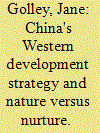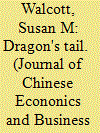| Srl | Item |
| 1 |
ID:
080152


|
|
|
|
|
| Publication |
2007.
|
| Summary/Abstract |
The current trend of rising inequalities in industrial development between East and West China has resulted from a combination of nature and nurture. Given the natural tendency for firms to agglomerate in a developing, market economy, and the numerous geographical and historical factors that have long favoured the Eastern region, it is hardly surprising that this is where Chinese industry has become increasingly agglomerated in recent decades. It is even less surprising in light of deliberate policy choices that compounded, or nurtured, this natural tendency. Left to market forces alone, the agglomeration process should reverse itself (to some extent) in the (very) long-run, as firms relocate to provinces with relatively low costs of production. However, that theoretical long-run is too far away for the Chinese central government, which has introduced a 'Western Development Strategy' to try and speed up economic development in China's poorest region. This paper assesses the likelihood that this Strategy in its current guise will succeed in promoting industrial development in the West.
|
|
|
|
|
|
|
|
|
|
|
|
|
|
|
|
| 2 |
ID:
080153


|
|
|
|
|
| Publication |
2007.
|
| Summary/Abstract |
This research examines the role of post-1999 'Develop the West' policies in promoting accelerated economic development in Chengdu and Chongqing, the two largest, spatially proximate metropolitan centers of western China. Differences between these two cities test theories regarding utilization of characteristics that flow from a place's location, history, political-economy, and cultural resources. Chengdu serves as the traditional capital of Sichuan province. The mountainous setting of Chongqing relegated it to a military-industrial complex dominated by state-owned enterprises. Its new autonomous status and completion of the Three Gorges Dam will solidify the city as the western edge of the Yangtze. It is argued that geographically reinforced historical cultural patterns form the basis of systemic problems. A key difference between the two cities lies in their different utilization of university research, a proxy for openness to information fueling change. Statistics and interviews accumulated in both cities flesh out this comparative examination of two major geographical bases for economic dynamism in west China.
|
|
|
|
|
|
|
|
|
|
|
|
|
|
|
|
| 3 |
ID:
080151


|
|
|
|
|
| Publication |
2007.
|
| Summary/Abstract |
The chemical industry in China is facing fierce competition and exposure to market forces as a result of changes in the country's economic policy. The Chinese government has applied administrative actions rather than simply relying on market forces to address the changing dynamics. It has attempted to privatise state-owned chemical enterprises (SOCEs) by corporatisation, coupled with industrial restructuring by merging individual state-owned enterprises into groups. Based on a quantitative survey in combination with case studies of two Chinese chemical enterprises, this paper concludes that in this industry building competences is more effective than privatisation and restructuring to improve performance
|
|
|
|
|
|
|
|
|
|
|
|
|
|
|
|